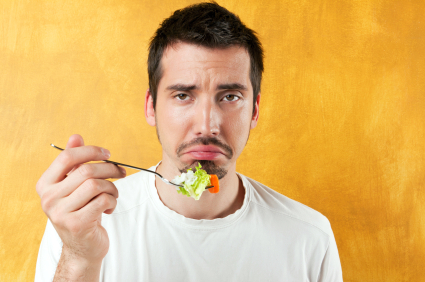Don't Trust Anyone With What You Put In Your Mouth!
 Traveling around the world for eight months earlier this year has taught me something simple, but really important: don't trust anyone with what you put in your mouth!
Traveling around the world for eight months earlier this year has taught me something simple, but really important: don't trust anyone with what you put in your mouth!
I visited over 25 countries from July last year until April of this year, with the intent of meeting some like-minded people and spreading the message about the benefits of a mostly raw, plant-based diet. I visited with many people and shared thoughts on raw food eating and what it's like to do it in the most unlikely places (like Iceland!)
Over and over again, I have found that in most places of the world, it's easier to lead an unhealthy life than a healthy one, and that almost *no one* really understands even just basic health concepts, like not eating animal products.
I remember I was in Turkey last September, and was trying to order something healthy at a restaurant. I knew five phrases in Turkish, and one of them was: "Do you have any vegetarian food and salads?"
Then the waiter proceeded to try to sell me on ordering a chicken dish. "Oh yeah, we have chicken. Chicken is vegetarian! Very good!"
I tried to tell him that chicken was NOT vegetarian, but with the straightest face he kept trying to convince me that chicken was perfectly okay to eat for vegetarians because it was not red meat.
After a round of arguing in English and in the few words I knew in Turkish, I managed to order some kind of Turkish salad, which was quite a feat too, because I had to explain what I didn't want in the salad. In the end, the waiter appeared a bit upset.
You've probably heard some stories of people who order a "decaf" coffee, only to realize later, after they're all wired up, that the waiter made a "mistake" and brought regular, fully-caffeinated coffee instead.
"Oh sorry, we made a mistake!"
And just how do they plan to correct that mistake, especially if the person has ordered their "decaf" in the evening and won't be able to fall asleep that night? It's quite funny, sometimes.
Many vegans have reported the experience of ordering something that was supposedly vegan, only to realize later that the soup broth that their vegetables are bathing in was made with the carcasses of dead animals.
The worst thing is when restaurants *pretend* to have options for vegetarians, when in fact they don't. I've found many places like this on my trip around the world.
There was a place in Greece that advertised "vegetarian food" in big bold letters outside of their restaurant. When I entered to check it out, I looked at the menu and noticed that nothing on it was vegetarian… just salad topped with salmon, eggs, and cheese.
Then I asked the waiter what their "vegetarian" food was. He explained to me in broken English that they had plenty of "vegetarian" salads. When I pointed out that they all contained meat, fish, cheese or eggs, he told me that these items could be left out.
Talk about a vegetarian menu!
Getting raw foods while traveling was not always an easy task. In some countries, I would ask people where I could buy fruit. I would even ask Taxi drivers to take me to "the best place I can buy fruit."
In 90% of cases, they would take me to a regular supermarket or corner store. In fact, they did not take me to a great supermarket, just an average one, generally the closest one.
Then I learned that I had to specify that I did not want to go to a supermarket but to a place that sold "only fruits and vegetables," like a public market.
I had to learn the word for "public market" in many languages to get my point across!
When it came to breakfasts at B&Bs and hotels, it was always a disappointment. At first, I would explain that I just wanted fruit for breakfast.
But for some mysterious reason, just saying that I wanted "only fruit" for breakfast was understood as "this guy wants fruit along with the rest of his breakfast." Even in places where English was the first language, like Australia or New Zealand!
So in the morning, I would get a regular plate of eggs, toasts, jam, coffee, and some fruit!
When I finally managed to explain that I actually ate ONLY fruit in the morning, people were very puzzled and reluctantly brought me one piece of totally unripe banana along with some other kind of unpalatable unripe fruit.
In the end, I had to visually describe exactly what we needed beforehand, by writing emails to the owners of the B&B.
"I only eat fruit for breakfast. I hope that's not too much trouble for you? In fact, it might make your job a lot easier… but I do eat a LOT of fruit. For example: an entire large papaya with 4 fully ripe bananas."
I found that by describing exactly what I needed, along with exact quantities, I got better results, but some people still didn't get it. They brought me totally unripe bananas and only a little more fruit than normal.
I then modified my approach to explain that I'd be "more than happy" to pay for any extra costs of buying all this fruit.
At that point I got good results about half the time, but the portions were still depressingly small. That was okay because I thought of this breakfast as a snack before my real breakfast that I would make in my room!
In the end, my wife Veronica had the idea of putting together a mini-website along with pictures, showing exactly what we eat for breakfast. She got this idea at the end of our trip, so we didn't have time to try it out. I suspect though, that some people still wouldn't get it!
The best thing is to be 100% self-sufficient and be in control of what you put in your body at all times. But if you have any social life at all, you will inevitably have to deal with restaurant waiters and other people responsible for serving you food, once in a while.
Here are some tips:
1) Be Extremely Clear — Don't just say that you're vegan, most people don't understand what that is! Explain exactly what it is that you don't eat. For example, you could say: "I don't eat any dairy products: including milk, butter, cheese, sour cream, and anything coming from milk. I also don't eat meat, chicken, pork, chicken, fish…"
Depending on what you're ordering, make sure to enumerate every single thing that could end up in your food that you don't want.
2) Give Options — Most waiters and chefs will be extremely discouraged upon hearing this long list of negatives. So make sure to describe some options, if that's the case.
For example, when we were stuck in a resort island in Fiji and NOTHING on the menu was even remotely raw or vegan, I gave the chef a long list of possible dishes they could make for us, along with ingredient lists for each, based on what I knew they could get on the island.
Initially the chefs had no idea what they could make, but after seeing this list, they suddenly "remembered" that they were trained chefs and could come up with delicious dishes, when given some guidelines.
3) Triple Check — Even if you clearly explain what you want, there's a good chance that some people still won't get it. So it's a good idea to triple-check with the waiter, if you have any doubt that they won't understand.
4) Don't Get Resentful — Some restaurants will refuse to cater to the needs of vegans. And that's okay. I prefer that a restaurant be honest and say that they WON'T make anything vegetarian, rather than claim they will and then fall short on their promise.
It's pretty unlikely that there won't be anything you can order and modify on the menu. But there's a chance that you might not be able to make a nice meal out of it. That's okay. Order a simple salad, and enjoy a good time with friends.
5) Be Willing to Make Compromises — I'm not saying that you should compromise on your principles, but be reasonable. Maybe the salad you got was not organic, or that the olives they put on your salads are from a can.
You don't want to be the impossible client who returns every single dish and gets angry. There's a good chance that eating five black olives from a can won't kill you. In fact, there's a good chance that it will do zero damage to your body. So learn to relax a bit, and enjoy your food, even if it's not 100% perfect.
If they put a big hard-boiled egg on your salad, you could simply take it out instead of returning the entire dish and passing again for an ungrateful impossible person.
NOTE: You can still draw the line somewhere. I refuse to eat certain things, like animal products when they show up in my food.
6) Prepare for Disappointment. There's a good chance that you'll be disappointed with the food. Come prepared! I know many people who carry little jars of their own dressings when they go to restaurants, or bring a ripe avocado in their purse! I've done it and it works.
It's amazing how a simple salad of raw vegetables can be totally transformed with a healthy dressing. Nobody will be upset that you brought your own dressing, but if you go to a more upscale restaurant, you might explain to them that you're on a special diet and request that they bring you your salad with your dressing served on it.
7) Don't Trust Anyone! People love to say "yes" when in fact they can't deliver. Don't trust that the decaf you're drinking is actual decaf. You might be better off ordering something else that you know has no caffeine (decaf is almost as bad as real coffee anyway).
Don't trust that the person you talked to understood your needs even though they said they did. Often people say "yes" just to avoid confrontation and appear competent, even when they have no idea what you actually meant. That's particularly true in foreign countries.
Finally, learn to enjoy life and live it to the fullest, no matter where you are and what the circumstances are.
Frederic Patenaude's Blog
- Frederic Patenaude's profile
- 11 followers




